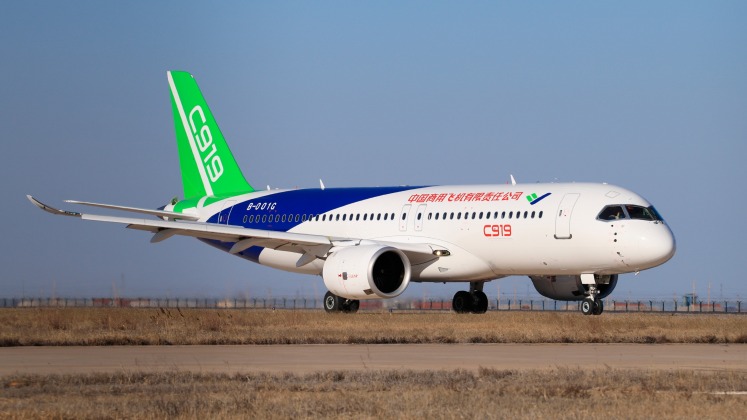News
China’s C919 Boeing 373 Rival Completes Pre-Delivery Test Flight: What Are the Strategic Implications?
On May 14 the C919 airliner produced by the state owned Commercial Aircraft Corporation of China (Comac) completed its first pre delivery three hour test flight in Shanghai. “This marked a successful test flight of the first C919 plane ahead of its delivery to the first customer,” Comac announced, highlighting that “the flight test completed all the scheduled tasks, and the aircraft performed well and was in good condition.” The flight took place at the Shanghai International Pudong Airport, and followed the aircraft’s first flight in 2017 and the entry into the airworthiness certification process of China’s civil administration in December 2020. As China’s first indigenous trunk jetliner, the aircraft’s entry into service is expected to have significant strategic implications and break the duopoly of Boeing and Airbus in the field. The airline has 158-168 seats and a range of 4,075-5,555 km, and its success is expected to be followed by the development of heavier longer ranged civil aircraft. The serial production aircraft is expected to be delivered to delivered to China Eastern Airlines after some further testing, which is one of 28 clients to have placed orders. 815 C919s are already on order.

The anticipated success of the C919 comes as Chinese aviation has made notable strides over the past decade particularly in the military field, including not only being the world’s only developer of fifth generation fighters outside the United States with a complete product in service, but also successes in developing transports and bombers. The Y-20 heavy airlifter in particular stands out for being the largest transport aircraft in production anywhere in the world, and demonstrated its extreme range in April when making deliveries of air defence systems to Serbia. The C919’s success will have not only strategic implications for China’s economy, likely improving the balance of trade with Europe and the United States significantly, but also military ones with the airliner and its successors potentially entering service in the People’s Liberation Army. It also allows countries under Western economic sanctions to acquire new airliners and strengthen their civil aviation. Aviation has been one of the few fields of civil transportation where China has remained behind its Western competitors, with the country leading the world in fields such as electric cars and high speed rail. The ability to produce transport aircraft on a very large scale remains highly valuable for protracted conflicts, particularly as supplies of spare parts from Western powers are considered unreliable as demonstrated by sanctions targeting Iranian and Russian aviation, with the aircraft having the potential to support military logistics in wartime. The fact that Western-supplied aircraft have been bugged in the past on delivery to China has provided a further incentive to pursue a domestic airliner.












